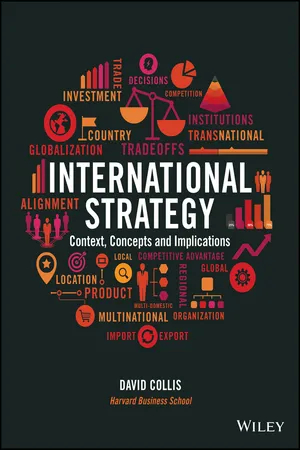MOTIVATION
On my birthday, my wife, who usually buys most of my clothes, included among my presents several shirts. I admired the colors – bright, because she accuses me of dressing like an English schoolboy – and the styling, but, in all honesty, I was more impressed by the origin of the shirts. One was from Mexico. A second was from Malaysia. No surprises there. But the third was from Mongolia. Mongolia! With the alliterative three Ms, I knew I had the opening for this chapter. What more evidence do you need for the ubiquity of international competition than three shirts, purchased at the same US store, coming from three countries as different as Mexico, Malaysia, and Mongolia?
But that is not all. The UN currently lists 17 countries beginning with the letter M. As a quick test of your global awareness, can you list all 17?1 Would it have surprised you if that third shirt had come from any one of those 15 other “M” countries? I think not. The fact that today a basic commodity could come from literally any of 17 countries beginning with the letter M is indicative of just how interconnected the world economy has become. To confirm this, do what I ask my students to do to their neighbors on the first day of class – look at their underwear! Where was it manufactured?2 Point made.
But it is not just the products you buy that are affected by international competition. So is your job and the salary you receive in that position. How many of you can honestly say that your career has been untouched by foreign competition capturing the market for your products, or when a desirable job opportunity was either “offshored” or pursued by an internationally mobile applicant from another country?3
We are all familiar with the offshoring of over 2 million US manufacturing jobs that are estimated to have been relocated overseas since 1983,4 but even in my sphere which is perhaps the last bastion of invulnerability to offshoring – academia – the threat is real. Already some IT support functions for higher education have been moved to India and contributed to the growth of an industry that now employs over two and a half million workers (Ghemawat, 2011). Some professors have left the USA for positions at foreign institutions: from Harvard Business School, professors have recently gone to be deans of business schools in China and the UK, and the President of Caltech left to run the King Abdullah University of Science and Technology in Saudi Arabia. Further, students have been voting with their feet by choosing to attend a university outside their home country. One in ten students at Scottish universities is now from England (not just hoping to study with a member of the royal family) even though they pay tuition fees their Scottish brethren do not. Australia is one of the largest educators of foreigners with over 500,000 overseas students, or about 25% of the student population in higher education.5 And many countries, such as Malaysia, are building their own institutions to bring their students home from the UK and Australia.6 When even academia is subject to the vagaries of international competition, we know it must be having an effect!
I began to draft sections of this book in the late 1990s, a period that saw diminished interest in issues of international competition. The threat from Asia, and Japan in particular, appeared to be over after the Japanese bubble burst in 1990 and the Asian tigers suffered the crisis of 1997. The Internet and the “new economy” took all the news, bursting onto the scene with the promise of huge and lucrative new markets. Yet international competition always remained a vital part of the economy. Even today, which is the more interesting business opportunity: another channel of distribution to reach existing customers called the Internet, which perhaps accounts for 5% of your sales;7 or a huge foreign market that typically accounts for at least 80% of your global industry?8 Put another way, the entire Internet economy today is only equivalent to the GDP of the fifth largest country in the world (Dean et al., 2012).
As I conclude this book in the second decade of the twenty-first century, international competition is back on the front burner. The bursting forth of China, and to a lesser extent the other BRIC countries and emerging markets, onto the world trade stage has brought about a new wave of concern about globalization – this time affecting professionals as well as manual workers. Offshoring has reappeared as a campaign issue in the US Presidential elections. China has grown at a compound rate of nearly 10% per annum for the last 20 years, putting to shame developed country growth rates even before their recent struggles. With that country's growth, along with the rise of India, it is as if nearly 2 billion new workers and consumers suddenly appeared on the world scene, adding one-third to the population integrated into modern economic activity. No wonder there have been huge repercussions from these events.
The “Great Recession” only heightened our awareness of global interconnectedness. What began as a subprime mortgage crisis in the USA in 2007 quickly became a global financial crisis and then a global recession as “financial contagion” spread around the world. Capital flows, both long-term investment and short-term speculative, dominate the world exchanges. Up to $5 trillion is traded internation...
